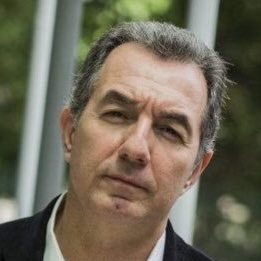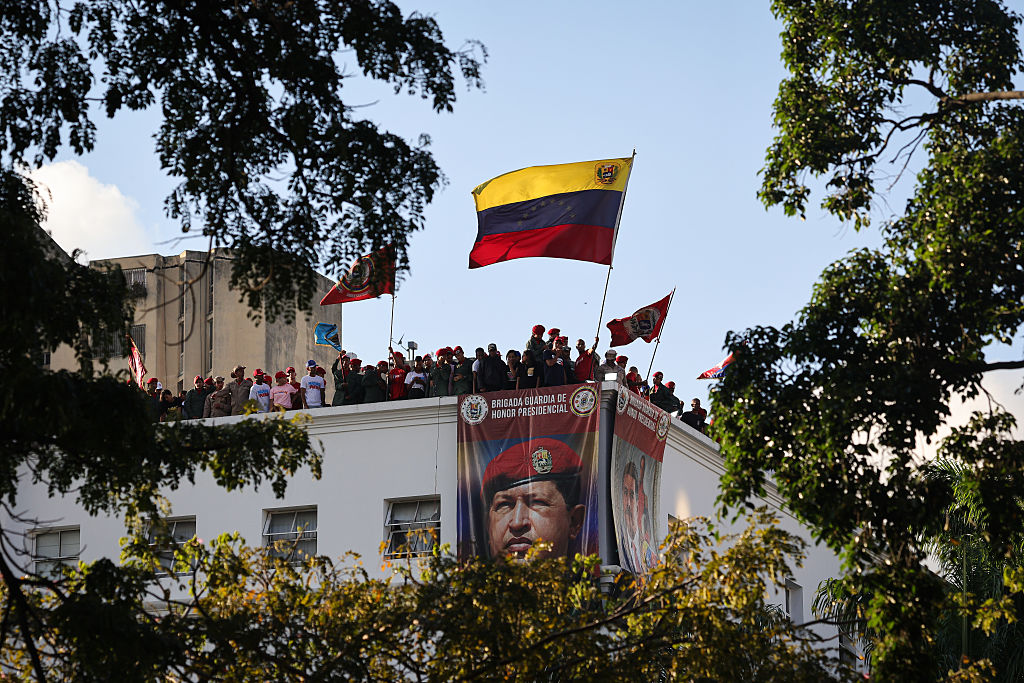
CARACAS—In many respects, Venezuela is undergoing its most profound political crisis since Hugo Chávez rose to power in 1999. An illegitimate regime in power is being cornered by a U.S. administration ostensibly fighting drug trafficking at sea but rooting for change at Miraflores, the nation’s presidential palace. While many scenarios could materialize in the months to come, history and conditions on the ground point to a narrow set of likely outcomes.
From abroad, the Trump administration has resorted to military provocations, unleashing lethal strikes against alleged drug trafficking vessels in the Caribbean and the eastern Pacific, and carrying out the largest deployment of naval and air assets ever seen in the area. The arrival of the aircraft carrier USS Gerald R. Ford in the Caribbean symbolizes operational coercion rather than mere deterrence.
On the internal front, despite waving the flag of anti-imperialism to coalesce the once thriving Chavista ranks, Nicolás Maduro is dealing with diminished popular support and an economy in shambles. The economic picture is so grave that, in earlier times, it alone would have triggered massive unrest. The IMF estimates the country will end 2025 with 270% inflation as the bolívar continues to depreciate precipitously. Defeated at the ballot box in the 2024 elections, Maduro has remained in power by resorting to intensifying paranoid repression. Foro Penal, the leading NGO tracking human rights violations in the country, reported 882 political prisoners as of November 10, reflecting the government’s expanded use of selective incarceration to “cool down” protest hotspots and prevent opposition organizing.
While the Trump administration denies that its objective is regime change, everyone in Venezuela understands that the narrative of a “war on drug trafficking” does not exclude this possibility—especially as the U.S. government accuses Maduro of leading a transnational drug trafficking network.
Given the dynamics of external coercion and internal weariness, two short-term scenarios stand out as most likely: either Maduro stays and cracks down even harder, or U.S. military pressure fractures the regime and forces it to step down.
Another crackdown
If the status quo endures, it would reflect adaptation by Maduro and his acolytes. Under this scenario, the regime may be able to scrape by weaponizing the narrative of “external aggression and careful management of foreign currency scarcity, tightening controls,” to justify emergency measures—including those granted under a “state of external shock” decree already approved and ready to be activated in case of aggression. Naturally, Maduro is likely to use this narrative to characterize dissent as collusion with foreign powers.
Meanwhile, the government may be able to manage the risk of weakened cohesion within the military through military drills, civil-military integration, and control over illicit revenues—all of which increase the cost of military dissent and close visible cracks within the high command. Selective repression (not necessarily massive, as loyalty cannot be fully guaranteed) and territorial control over key logistics (fuel, ports, telecommunications) can reduce the likelihood of nationwide uprisings. However, they cannot prevent local flare-ups over service collapses or aggravated abuses.
A worsening economic picture would reinforce this crackdown. Venezuela has already suspended a gas accord with Trinidad and Tobago over the Dragon field, which would cut off a potential source of non-sanctioned foreign-currency liquidity, further tightening government cash flow and forcing costlier, less efficient exchange interventions.
In short, the regime can survive short-term depreciation and social-cost repression at the cost of rapid and deep erosion of living standards within Venezuela. This would lead to a self-reinforcing cycle of greater social pressure, heavier repression, and accelerating emigration.
This “deferred implosion” could entrench an autocracy that will rely on migration as a release valve.
The transition scenario
The most plausible near-term transition scenario does not involve a foreign military intervention that directly overthrows the government. Instead, external pressure creates fissures within the regime, leading to a negotiated exit for Maduro.
Historical experience shows that when international pressure is coherent, targeted, and backed by credible enforcement, it can alter the cost-benefit calculus of authoritarian elites in ways that domestic actors alone cannot. In 1994, for example, the combination of U.S. naval pressure, OAS-backed diplomacy, and the credible threat of the restored democratic mandate pushed Haiti’s military rulers to step aside and allow President Jean Bertrand Aristide’s return, not because they were defeated in the field but because the price of holding on became intolerable for the officers who sustained the regime.
In this scenario, the U.S. escalates its military presence by positioning the USS Gerald Ford, and strikes in Venezuelan territory, targeting infrastructure linked to drug trafficking operations, as President Donald Trump has envisioned. This would strengthen the narrative connecting the Venezuelan government to regional narcotrafficking but also disrupt the rewards system Maduro uses to maintain key military figures on his side.
This disruption could well trigger realignments within the regime as elite factions scramble to protect their own personal security, wealth, and other privileges. When the loyalty of enough key figures begins to waver, Maduro may find that the best way to preserve his own life and freedom is to seek a negotiated exit featuring multilateral verification and a gradual process of transitional justice.
A turning point
Suppose external pressure does persuade Maduro or his allies to pursue a negotiated exit. In that case, it is very unlikely to lead to disruptive social conflict, such as large pro- and anti-Maduro factions clashing in the streets. All serious opinion polls estimate that about 80% of Venezuelans oppose the regime, with only around 20% identifying as Chavistas. Moreover, many of those Chavistas do not support Maduro. The small minority still backing Maduro would likely fade into the background rather than incite unrest during a negotiated transition.
The awarding of the Nobel Peace Prize to María Corina Machado bolsters this transition scenario by providing international legitimacy to her leadership and Venezuela’s democratic struggle. This, along with credible transition guarantees, makes such a process more appealing to elites worried about potential future legal repercussions.
In the very short term, we are most likely facing an induced trajectory—not a foreign military invasion or a civil uprising. The alternative is a worse autocratization, with unprecedented levels of poverty that will postpone the collapse at the cost of greater repression, more migration, institutional erosion, and humanitarian costs.






